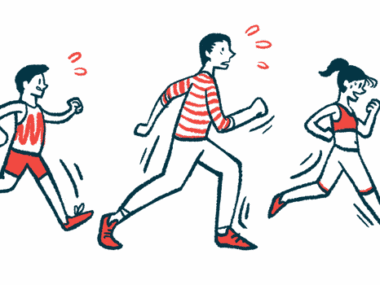Remote exercise program seen to increase leg strength in CF adults
Findings of short-term program support need for long-term research: Study
Written by |

An eight-week remote exercise program of moderate to high intensity increased leg muscle strength and reduced body fat in adults with cystic fibrosis (CF), a new study showed.
While no differences were found in lung function and quality of life, the gains seen with the short-term duration of the exercise program supports the need for long-term research “to know the extent of this effect,” the researchers wrote.
“Given the favorable response of muscle functionality to a short duration resistance exercise training … we believe that future longer term research with adherence analysis is necessary,” the team wrote. The data showed that more than 25% of the participants in the small study did not complete the roughly two-month-long program.
The study, “Effects of a remotely supervised resistance training program on muscle strength and body composition in adults with cystic fibrosis: Randomized controlled trial,” was published in The Scandinavian Journal of Medicine & Science in Sports.
Gains of 38% seen in leg muscle strength with exercise program
In addition to well-known limitations in lung function, and other symptoms common in CF, patients often experience muscle loss associated with chronic inflammation and insufficient nutrient absorption. Getting physical exercise is a critical part of maintaining health for people with CF.
Still, in-person exercise programs may be difficult for individuals with CF to adhere to given the higher risk of lung infections among patients and the burden that other treatments represent.
Here, a team of researchers in Spain examined a remotely-supervised resistance training program and explored its potential benefits in CF patients.
The clinical trial (NCT05173194), which ran from October to December 2021, involved 32 adults with CF who had a mean age of 32.13 years. Exercise consisted of one-hour sessions of remote-resistance training, three times a week, for eight weeks or about two months. Controls engaged in physical activity suggested by their physician.
The exercise group was followed remotely by trained monitors and each session included warmup, resistance training exercises, and cool down. Patients were assigned to one of three intensity levels, according to their lung function and physical condition. Overall, the exercises included triceps extensions, knee and back extensions, shoulder abductions, front and side planks, and femoral bicep (thigh) curls.
The main outcomes were peripheral muscle strength and body composition, with additional outcomes including pulmonary function and quality of life.
Overall, 23 patients — 14 in the exercise group and nine in the control group — completed the study. The training program was well tolerated with a compliance of 80%.
The analysis showed a significant increase in leg muscle strength — by 38% — in the exercise group compared with the start of the study, or baseline. Meanwhile, no increase was detected in the control group. However, exercise did not lead to benefits in upper body strength.
Additionally, the exercise group showed significantly less total fat — a mean reduction of 5.23% — as well as a lower fat mass index, reduced by 5.23%, and a lower body adiposity index, which dropped by 5.12%. The adiposity index is a measure based on a ratio of hip circumference to height.
This was accompanied by a mean 2.04% increase in total fat-free mass, a 2.83% increase in trunk fat-free mass, and a 2.04% increase in fat-free mass index, in which higher values mean greater muscle mass.
An 8-week remotely supervised resistance training program, with moderate to high intensity, effectively improved lower limb muscle strength and body composition.
At the end of the program, no significant benefits were found in pulmonary function, as assessed by standard measures called forced expiratory volume in one second and forced vital capacity. Nor were improvements seen in quality of life, measured by the Cystic Fibrosis Questionnaire-Revised, which assesses domains or areas such as physical and emotional functioning, vitality, body image, eating disturbances, treatment burden, weight, respiratory symptoms, and digestive symptoms.
Overall, “an 8-week remotely supervised resistance training program, with moderate to high intensity, effectively improved lower limb muscle strength and body composition,” the researchers wrote.
The researchers noted that CF patients often experience poor nutrition that results in a low body mass index, a measure of weight relative to height.
“Physical exercise is a tool to potentiate improvements in this body composition and its clinical consequences,” the study concluded.
As a study limitation, the investigators noted the considerable number of participants who dropped out of the program, which was attributed to difficulties in getting to the testing sites.
“The clinical situation of adult patients with CF explains these difficulties,” the team wrote.






